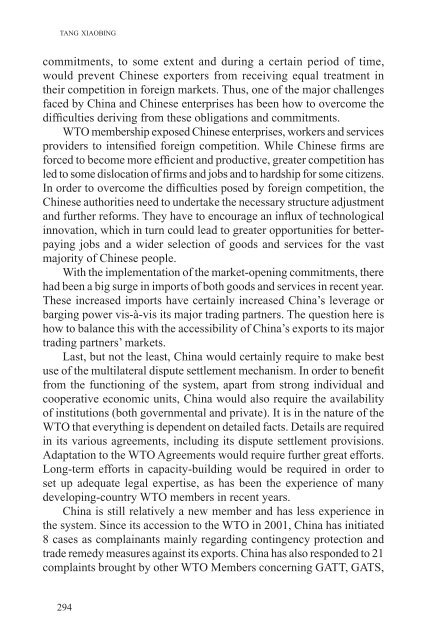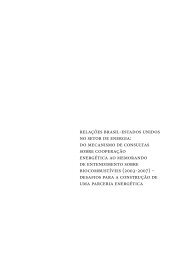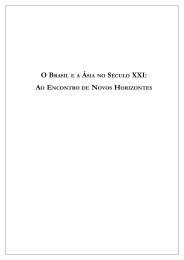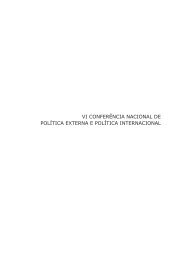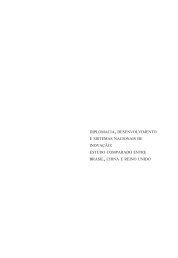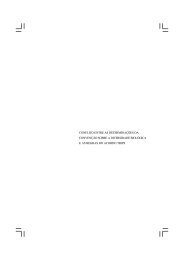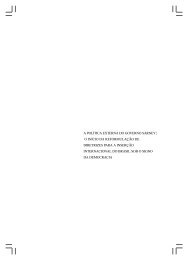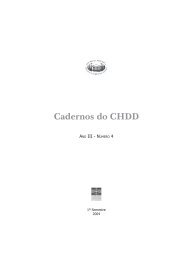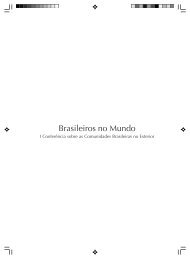- Page 1 and 2:
asil e china no reordenamento das r
- Page 3 and 4:
Brasil e China no Reordenamento das
- Page 5 and 6:
Sumário Introdução, 7 1. Políti
- Page 7 and 8:
Introdução Anna Jaguaribe Este li
- Page 9:
introdução Não obstante esteja s
- Page 13 and 14:
1.1 China Brasil Affonso Ouro Preto
- Page 15 and 16:
china brasil que afetaram prioritar
- Page 17 and 18:
china brasil Outros acreditam que a
- Page 19 and 20:
china brasil por acontecimentos de
- Page 21 and 22:
china brasil A sua posição de Mem
- Page 23 and 24:
china brasil diminui apesar de sua
- Page 25 and 26:
china brasil A China se tornou o pr
- Page 27 and 28:
china brasil preços elevados para
- Page 29 and 30:
china brasil nacional brasileiro. O
- Page 31 and 32:
china brasil organizar um sistema d
- Page 33 and 34:
china brasil Em primeiro lugar a ex
- Page 35 and 36:
1.2 Brasil e China na Reorganizaç
- Page 37 and 38:
asil e china na reorGanização das
- Page 39 and 40:
asil e china na reorGanização das
- Page 41 and 42:
asil e china na reorGanização das
- Page 43 and 44:
asil e china na reorGanização das
- Page 45 and 46:
asil e china na reorGanização das
- Page 47:
asil e china na reorGanização das
- Page 50 and 51:
jin canronG Key words: Internationa
- Page 52 and 53:
jin canronG in the pursuit of moder
- Page 54 and 55:
jin canronG remain in the circle of
- Page 56 and 57:
jin canronG swifter and deepened re
- Page 58 and 59:
jin canronG infrastructures, prepar
- Page 60 and 61:
jin canronG cohesiveness. The trans
- Page 62 and 63:
jin canronG China wishes to be reco
- Page 64 and 65:
jin canronG other countries, and in
- Page 67 and 68:
2.1 Relações Brasil-China: Elemen
- Page 69 and 70:
elações brasil-china: elementos d
- Page 71 and 72:
elações brasil-china: elementos d
- Page 73 and 74:
elações brasil-china: elementos d
- Page 75 and 76:
elações brasil-china: elementos d
- Page 77 and 78:
elações brasil-china: elementos d
- Page 79 and 80:
elações brasil-china: elementos d
- Page 81 and 82:
2.2 Brasil e China, sócios ou riva
- Page 83 and 84:
asil e china, sócios ou rivais? vi
- Page 85 and 86:
asil e china, sócios ou rivais? pr
- Page 87 and 88:
asil e china, sócios ou rivais? Co
- Page 89 and 90:
2.3 Brasil-China: Desafios e Oportu
- Page 91 and 92:
asil-china: desafios e oportunidade
- Page 93 and 94:
asil-china: desafios e oportunidade
- Page 95 and 96:
Comércio e Investimentos brasil-ch
- Page 97 and 98:
asil-china: desafios e oportunidade
- Page 99 and 100:
asil-china: desafios e oportunidade
- Page 101 and 102:
Dificuldades a Superar brasil-china
- Page 103 and 104:
asil-china: desafios e oportunidade
- Page 105 and 106:
asil-china: desafios e oportunidade
- Page 107 and 108:
2.4 China-Brasil: Uma Relação Mul
- Page 109 and 110:
china-brasil: uma relação multifa
- Page 111 and 112:
china-brasil: uma relação multifa
- Page 113 and 114:
china-brasil: uma relação multifa
- Page 115 and 116:
china-brasil: uma relação multifa
- Page 117 and 118:
china-brasil: uma relação multifa
- Page 119 and 120:
china-brasil: uma relação multifa
- Page 121 and 122:
china-brasil: uma relação multifa
- Page 123 and 124:
china-brasil: uma relação multifa
- Page 125 and 126:
china-brasil: uma relação multifa
- Page 127 and 128:
china-brasil: uma relação multifa
- Page 129 and 130:
china-brasil: uma relação multifa
- Page 131 and 132:
china-brasil: uma relação multifa
- Page 133 and 134:
IV - Conclusões tentativas china-b
- Page 135:
china-brasil: uma relação multifa
- Page 138 and 139:
severino cabral “O mundo do sécu
- Page 140 and 141:
severino cabral transporte aéreo p
- Page 142 and 143:
severino cabral países vieram a se
- Page 144 and 145:
severino cabral documento elaborado
- Page 146 and 147:
severino cabral Há uma outra dimen
- Page 148 and 149:
severino cabral comum ao patrimôni
- Page 150 and 151:
severino cabral entre os povos e as
- Page 153 and 154:
2.6 Um novo modelo de desenvolvimen
- Page 155 and 156:
um novo modelo de desenvolvimento b
- Page 157 and 158:
um novo modelo de desenvolvimento b
- Page 159 and 160:
um novo modelo de desenvolvimento b
- Page 161 and 162:
um novo modelo de desenvolvimento b
- Page 163 and 164:
um novo modelo de desenvolvimento b
- Page 165 and 166:
um novo modelo de desenvolvimento b
- Page 167 and 168:
2.7 O XII Plano Quinquenal da China
- Page 169 and 170:
o xii plano quinquenal da china: co
- Page 171 and 172:
o xii plano quinquenal da china: co
- Page 173 and 174:
o xii plano quinquenal da china: co
- Page 175 and 176:
o xii plano quinquenal da china: co
- Page 177 and 178:
o xii plano quinquenal da china: co
- Page 179:
o xii plano quinquenal da china: co
- Page 183 and 184:
3.1 China Economic Developments, Pr
- Page 185 and 186:
china economic developments, prospe
- Page 187 and 188:
china economic developments, prospe
- Page 189 and 190:
china economic developments, prospe
- Page 191 and 192:
china economic developments, prospe
- Page 193 and 194:
china economic developments, prospe
- Page 195 and 196:
china economic developments, prospe
- Page 197 and 198:
china economic developments, prospe
- Page 199 and 200:
china economic developments, prospe
- Page 201 and 202:
china economic developments, prospe
- Page 203 and 204:
china economic developments, prospe
- Page 205 and 206:
china economic developments, prospe
- Page 207 and 208:
china economic developments, prospe
- Page 209 and 210:
3.2 A Ascensão Chinesa e as Matér
- Page 211 and 212:
a ascensão chinesa e as matérias-
- Page 213 and 214:
a ascensão chinesa e as matérias-
- Page 215 and 216:
a ascensão chinesa e as matérias-
- Page 217 and 218:
a ascensão chinesa e as matérias-
- Page 219 and 220:
a ascensão chinesa e as matérias-
- Page 221 and 222:
a ascensão chinesa e as matérias-
- Page 223 and 224:
a ascensão chinesa e as matérias-
- Page 225:
a ascensão chinesa e as matérias-
- Page 228 and 229:
jorGe arbache é crescentemente ass
- Page 230 and 231:
jorGe arbache Os investimentos chin
- Page 232 and 233:
jorGe arbache déficits das contas
- Page 234 and 235:
jorGe arbache Tabela 2: Evolução
- Page 236 and 237:
jorGe arbache 14,8%, em 2009 (figur
- Page 238 and 239:
jorGe arbache e produção de bens
- Page 240 and 241:
jorGe arbache Os elevados e crescen
- Page 242 and 243:
jorGe arbache Odisseu ouviu os cant
- Page 244 and 245: jorGe arbache incapacidade de cresc
- Page 246 and 247: jorGe arbache de desindustrializaç
- Page 248 and 249: jorGe arbache LEDERMAN, D. e MALONE
- Page 250 and 251: márcio pochmann posição altista
- Page 252 and 253: márcio pochmann Gráfico 2 - Impor
- Page 254 and 255: márcio pochmann Gráfico 4 - Evolu
- Page 256 and 257: márcio pochmann Gráfico 6 - Pauta
- Page 258 and 259: márcio pochmann a partir de outros
- Page 260 and 261: márcio pochmann participação da
- Page 262 and 263: márcio pochmann políticas interna
- Page 264 and 265: márcio pochmann alianças tecnoló
- Page 266 and 267: márcio pochmann 266 como fez a pol
- Page 268 and 269: márcio pochmann ROSEN, D. & HANEMA
- Page 270 and 271: nelson barbosa Termos de Troca e o
- Page 272 and 273: nelson barbosa 2. Efeito câmbio: e
- Page 274 and 275: nelson barbosa 274 desigualdade na
- Page 276 and 277: nelson barbosa Figura 4: Participa
- Page 278 and 279: nelson barbosa Concentrando nossa a
- Page 280 and 281: nelson barbosa de captação privad
- Page 282 and 283: nelson barbosa 4. Economias de esca
- Page 284 and 285: nelson barbosa simples: diversifica
- Page 287 and 288: 3.6 Brazil-China and the Reordering
- Page 289 and 290: azil-china and the reordering of in
- Page 291 and 292: azil-china and the reordering of in
- Page 293: azil-china and the reordering of in
- Page 297 and 298: azil-china and the reordering of in
- Page 299 and 300: azil-china and the reordering of in
- Page 301 and 302: azil-china and the reordering of in
- Page 303 and 304: azil-china and the reordering of in
- Page 305 and 306: azil-china and the reordering of in
- Page 307 and 308: azil-china and the reordering of in
- Page 309: azil-china and the reordering of in
- Page 312 and 313: vera thorstensen de US$ 191 bilhõe
- Page 314 and 315: vera thorstensen 2,8% e, em 2010, f
- Page 316 and 317: vera thorstensen Gráfico - Importa
- Page 318 and 319: vera thorstensen China: fluxo e est
- Page 320 and 321: vera thorstensen Investimentos estr
- Page 322 and 323: vera thorstensen Fonte RENAI/MDIC,
- Page 324 and 325: vera thorstensen pilares da economi
- Page 326 and 327: vera thorstensen 3. Os compromissos
- Page 328 and 329: vera thorstensen como pela atuaçã
- Page 330 and 331: vera thorstensen especiais de tarif
- Page 332 and 333: vera thorstensen - Salvaguardas tra
- Page 334 and 335: vera thorstensen É certo que a ace
- Page 336 and 337: vera thorstensen 4.1.2. China A Chi
- Page 338 and 339: vera thorstensen Fonte: WTO Tariff
- Page 340 and 341: vera thorstensen naturais. A partir
- Page 342 and 343: vera thorstensen 4.2. Acordos pluri
- Page 344 and 345:
vera thorstensen 4.3.1. Antidumping
- Page 346 and 347:
vera thorstensen se aplicar método
- Page 348 and 349:
vera thorstensen foram Argentina (4
- Page 350 and 351:
vera thorstensen Tabela 1 - Antidum
- Page 352 and 353:
vera thorstensen Tabela 4 - Medidas
- Page 354 and 355:
vera thorstensen Tabela 6 - Medidas
- Page 356 and 357:
vera thorstensen discriminam o com
- Page 358 and 359:
vera thorstensen compensatória, de
- Page 360 and 361:
vera thorstensen Em relação aos c
- Page 362 and 363:
vera thorstensen Tabela 12 - Medida
- Page 364 and 365:
vera thorstensen Por se tratar de m
- Page 366 and 367:
vera thorstensen Tabela - Medidas d
- Page 368 and 369:
vera thorstensen do que argumenta a
- Page 370 and 371:
vera thorstensen Tabela - Salvaguar
- Page 372 and 373:
vera thorstensen do presidente da R
- Page 374 and 375:
vera thorstensen resultado, a regul
- Page 376 and 377:
vera thorstensen outros sete membro
- Page 378 and 379:
vera thorstensen Os acordos da Chin
- Page 380 and 381:
vera thorstensen As discussões sob
- Page 382 and 383:
vera thorstensen no Fundo, o máxim
- Page 384 and 385:
vera thorstensen limites máximos n
- Page 386 and 387:
vera thorstensen 6.1.3. Efeitos do
- Page 388 and 389:
vera thorstensen Resultado: desvalo
- Page 390 and 391:
vera thorstensen país que manipule
- Page 392 and 393:
vera thorstensen transporte, e outr
- Page 394 and 395:
vera thorstensen aliada aos custos
- Page 396 and 397:
vera thorstensen 7. Uma agenda posi
- Page 398 and 399:
vera thorstensen - Análise da poss
- Page 400 and 401:
vera thorstensen THORSTENSEN, V., P
- Page 403 and 404:
4.1 Brasil e China juntos no Futuro
- Page 405 and 406:
asil e china juntos no futuro da na
- Page 407 and 408:
asil e china juntos no futuro da na
- Page 409 and 410:
asil e china juntos no futuro da na
- Page 411 and 412:
Anexo 1 - Figuras brasil e china ju
- Page 413 and 414:
4.2 Brasil-China: Buscar Convergên
- Page 415 and 416:
asil-china: buscar convergência na
- Page 417 and 418:
asil-china: buscar convergência na
- Page 419 and 420:
asil-china: buscar convergência na
- Page 421 and 422:
asil-china: buscar convergência na
- Page 423 and 424:
asil-china: buscar convergência na
- Page 425 and 426:
asil-china: buscar convergência na
- Page 427 and 428:
asil-china: buscar convergência na
- Page 429 and 430:
4.3 Cooperação em Pesquisa Agrope
- Page 431 and 432:
cooperação em pesquisa agropecuá
- Page 433 and 434:
cooperação em pesquisa agropecuá
- Page 435 and 436:
cooperação em pesquisa agropecuá
- Page 437 and 438:
cooperação em pesquisa agropecuá
- Page 439 and 440:
cooperação em pesquisa agropecuá
- Page 441 and 442:
cooperação em pesquisa agropecuá
- Page 443 and 444:
cooperação em pesquisa agropecuá
- Page 445 and 446:
cooperação em pesquisa agropecuá
- Page 447 and 448:
cooperação em pesquisa agropecuá
- Page 449 and 450:
cooperação em pesquisa agropecuá
- Page 451 and 452:
cooperação em pesquisa agropecuá
- Page 453 and 454:
4.4 Reflexões sobre a Política de
- Page 455 and 456:
eflexões sobre a política de c,t&
- Page 457 and 458:
eflexões sobre a política de c,t&
- Page 459 and 460:
eflexões sobre a política de c,t&
- Page 461 and 462:
eflexões sobre a política de c,t&
- Page 463 and 464:
eflexões sobre a política de c,t&
- Page 465 and 466:
eflexões sobre a política de c,t&
- Page 467 and 468:
eflexões sobre a política de c,t&
- Page 469 and 470:
eflexões sobre a política de c,t&
- Page 471 and 472:
eflexões sobre a política de c,t&
- Page 473 and 474:
eflexões sobre a política de c,t&
- Page 475 and 476:
eflexões sobre a política de c,t&
- Page 477 and 478:
eflexões sobre a política de c,t&
- Page 479 and 480:
eflexões sobre a política de c,t&
- Page 481:
eflexões sobre a política de c,t&
- Page 484 and 485:
luiz pinguelli rosa Estive na China
- Page 486 and 487:
luiz pinguelli rosa que a State Gri
- Page 488 and 489:
luiz pinguelli rosa Centro foi menc
- Page 490 and 491:
luiz pinguelli rosa Mais exemplos d
- Page 492 and 493:
luiz pinguelli rosa 3.2. Estudo de
- Page 494 and 495:
luiz pinguelli rosa - Intermediar c
- Page 496 and 497:
enato g. flôres jr. máquinas, pe
- Page 498 and 499:
enato g. flôres jr. Já em 2007, o
- Page 500 and 501:
enato g. flôres jr. Iniciou produz
- Page 502 and 503:
enato g. flôres jr. 4. O Caso Bras
- Page 504 and 505:
enato g. flôres jr. controle assoc
- Page 506 and 507:
enato g. flôres jr. mais, alteraç
- Page 508 and 509:
enato g. flôres jr. Enquanto na pr
- Page 510 and 511:
enato g. flôres jr. impressionar,
- Page 513 and 514:
4.7 Brasil e China: Muito Além da
- Page 515 and 516:
asil e china: muito além da comple
- Page 517 and 518:
asil e china: muito além da comple
- Page 519 and 520:
asil e china: muito além da comple
- Page 521 and 522:
asil e china: muito além da comple
- Page 523 and 524:
asil e china: muito além da comple
- Page 525 and 526:
asil e china: muito além da comple
- Page 527 and 528:
asil e china: muito além da comple
- Page 529:
asil e china: muito além da comple
- Page 532 and 533:
josé vicente de sá pimentel - É
- Page 534:
josé vicente de sá pimentel - O 1


